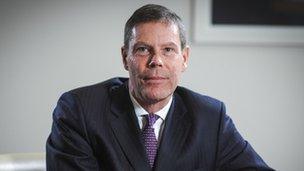Hector Sants joins Barclays to improve its reputation
- Published

Hector Sants was chief executive of the FSA for five years until June 2012
Hector Sants, the former chief executive of the Financial Services Authority, is joining Barclays bank.
He has been given a new top job to improve the bank's reputation with governments and regulators internationally.
His salary is not being disclosed, as he will not be a board director.
Barclays chief executive Antony Jenkins said Mr Sants would ensure that all staff met the spirit and letter of the law and regulators' expectations.
"Relationships with our regulators and governments around the world are obviously also of critical importance to us," Mr Jenkins said.
"With a huge wealth of private and public sector experience, and having most recently led one of the world's pre-eminent regulatory authorities, I can think of no more suitably qualified person than Hector Sants to take on these challenges."
Mr Sants will be in charge of hundreds of staff around the world and will report directly to Mr Jenkins.
For the first time the bank will have one person directly responsible for making sure all its 140,000 staff obey the law in the more than 50 countries where it operates and that it is held in higher esteem by governments and regulators.
A year of scandal
The appointment of Mr Sants comes at the end of the most torrid year in Barclays' history, during which its reputation has been severely damaged by a rapid succession of scandals:
In February, the government forced Barclays to pay an extra £500m in tax, after accusing the bank of devising and using two complex tax avoidance schemes
In March, the FSA said it was investigating allegations that Barclays had mis-sold complex financial contracts called swaps to some of its business clients. The FSA decided in June that Barclays was guilty, along with HSBC, Lloyds and RBS, and demanded they provide their customers with "redress". This may cost Barclays £450m
Earlier in June came the spectacular Libor-rigging scandal. Barclays was fined £290m by the UK and US authorities because of the sensational revelation that some of its traders had, over a number of years, tried to manipulate the daily calculation of the vital Libor interest rates
The scandal led to the departure of the bank's chief executive Bob Diamond, who was then replaced in August by Antony Jenkins. Other senior executives such as the chairman Marcus Agius also left
In July, the Serious Fraud Office started an investigation into payments between the bank and Qatar Holding, part of sovereign wealth fund Qatar Investment Authority, during 2008 when the bank was raising money from Middle East investors during the banking crisis
The same month Barclays set aside another £700m to compensate customers who had been mis-sold payment protection insurance (PPI). That came on top of the £1bn set aside in 2011 and the £300m in the first three months of 2012
Later in October, the bank revealed that the US authorities were carrying out two separate probes into its activities there
One was by the US Federal Energy Regulatory Commission (Ferc) into the way four traders had tried to manipulate power prices in California between 2006 and 2008. The bank has been threatened with a fine of £291m.
'Responsibility'
As the former boss of the UK's main financial regulator - which is now in the process of being split in two - Mr Sants should have the knowledge and credibility needed to restore Barclays reputation.
In September, the FSA revealed to MPs that as far back as 2010, Mr Sants had personally warned the then chairman of Barclays, Marcus Agius, that Bob Diamond might not be a suitable choice to become the bank's chief executive.
He had also conveyed the FSA's worries about the bank's culture, including the attitudes of its most senior staff to risk taking, and flouting the spirit of tax laws and banking regulations.
"I left the FSA with the intention of finding a role which would allow me to put into practice the experience I have gained in both the public and private sector," he said.
"Taking on the responsibility of leading Barclays global compliance function, and overseeing the bank's relationships with governments and regulators, gives me that opportunity," he added.